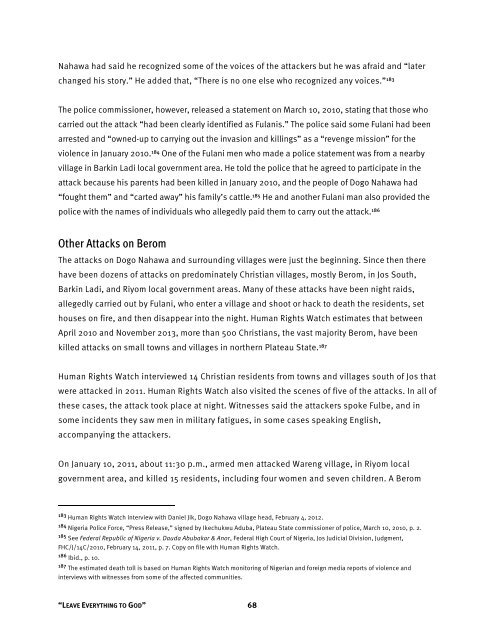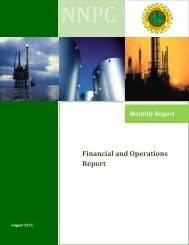You also want an ePaper? Increase the reach of your titles
YUMPU automatically turns print PDFs into web optimized ePapers that Google loves.
Nahawa had said he recognized some of the voices of the attackers but he was afraid and “later<br />
changed his story.” He added that, “There is no one else who recognized any voices.” 183<br />
The police commissioner, however, released a statement on March 10, 2010, stating that those who<br />
carried out the attack “had been clearly identified as Fulanis.” The police said some Fulani had been<br />
arrested and “owned-up to carrying out the invasion and killings” as a “revenge mission” for the<br />
violence in January 2010. 184 One of the Fulani men who made a police statement was from a nearby<br />
village in Barkin Ladi local government area. He told the police that he agreed to participate in the<br />
attack because his parents had been killed in January 2010, and the people of Dogo Nahawa had<br />
“fought them” and “carted away” his family’s cattle. 185 He and another Fulani man also provided the<br />
police with the names of individuals who allegedly paid them to carry out the attack. 186<br />
Other Attacks on Berom<br />
The attacks on Dogo Nahawa and surrounding villages were just the beginning. Since then there<br />
have been dozens of attacks on predominately Christian villages, mostly Berom, in Jos South,<br />
Barkin Ladi, and Riyom local government areas. Many of these attacks have been night raids,<br />
allegedly carried out by Fulani, who enter a village and shoot or hack to death the residents, set<br />
houses on fire, and then disappear into the night. Human Rights Watch estimates that between<br />
April 2010 and November 2013, more than 500 Christians, the vast majority Berom, have been<br />
killed attacks on small towns and villages in northern Plateau State. 187<br />
Human Rights Watch interviewed 14 Christian residents from towns and villages south of Jos that<br />
were attacked in 2011. Human Rights Watch also visited the scenes of five of the attacks. In all of<br />
these cases, the attack took place at night. Witnesses said the attackers spoke Fulbe, and in<br />
some incidents they saw men in military fatigues, in some cases speaking English,<br />
accompanying the attackers.<br />
On January 10, 2011, about 11:30 p.m., armed men attacked Wareng village, in Riyom local<br />
government area, and killed 15 residents, including four women and seven children. A Berom<br />
183 Human Rights Watch interview with Daniel Jik, Dogo Nahawa village head, February 4, 2012.<br />
184 Nigeria Police Force, “Press Release,” signed by Ikechukwu Aduba, Plateau State commissioner of police, March 10, 2010, p. 2.<br />
185 See Federal Republic of Nigeria v. Dauda Abubakar & Anor, Federal High Court of Nigeria, Jos Judicial Division, Judgment,<br />
FHC/J/14C/2010, February 14, 2011, p. 7. Copy on file with Human Rights Watch.<br />
186 Ibid., p. 10.<br />
187 The estimated death toll is based on Human Rights Watch monitoring of Nigerian and foreign media reports of violence and<br />
interviews with witnesses from some of the affected communities.<br />
“LEAVE EVERYTHING TO GOD” 68




